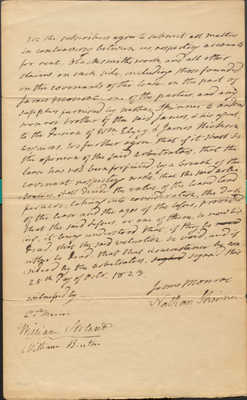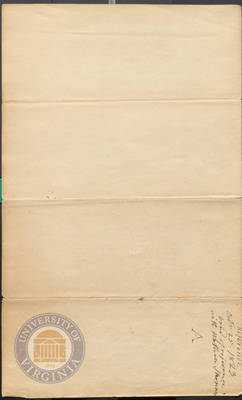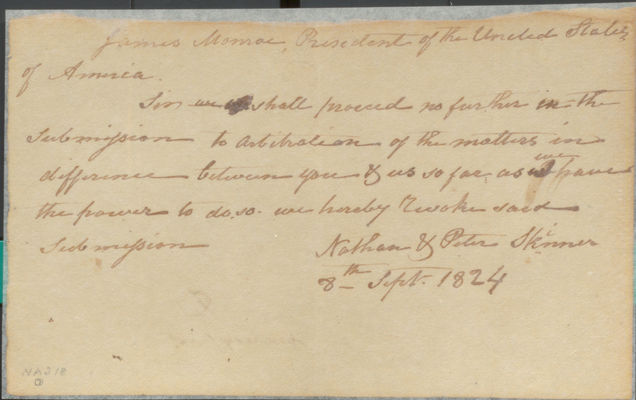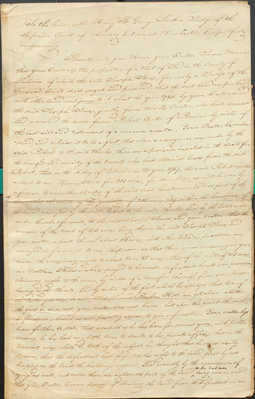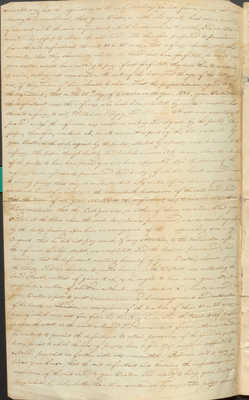Pages
Agreement to Arbitration between James Monroe and Peter Skinner, 25 October 1823 - Page 1
Viz the subscribers agree to submit all matters in controversy between us, respecting accounts for rent, blacksmiths work, and all other claims, on each side, including those founded on the covenants of the lease, on the part of James Monroe, one of the parties, and any supplies furnished by Nathan Skinner to Andrew Monroe brother of the said James, & his agent, to the [ ] of Wm. Elgcy, & James Nichason Esquires. We further agree, that if it shall be the opinion of the said arbitrators, that the lease has not been forfeited, by a breach of the covenant respecting work, that the said arbitrators, shall decide the value of the leased land per acre, taking into consideration, the date of the lease and the ages of the lesses, provided that the said Lessees, or one of them, be now living, it being understood that, if they be dead, that the said valuation be void, and if either be dead, that the circumstance be considered by the arbitrators. signn'd this 25th day of Octr. 1823.
James Monroe Nathan Skinner
Witnessed by G.F. Mercer William Noland William Renton
[NA317]
Agreement to Arbitration between James Monroe and Peter Skinner, 25 October 1823 - Page 2
Reference: Oct. 25 1823 bond of reference with Nathan Skinner
A
Skinner Revocation of Agreement to Arbitrate Addressed to Monroe, 8 September 1824
James Monroe, President of the United States of America
In [?] proceed no farther in the Submission to arbitration of the matters in difference between you and us so far as we have the power to do so. We hereby revoke said Submission
Nathan V Peter Skinner 8th Sept. 1824
Brief Prepared by James Monroe in Monroe v. Skinner, 20 October 1824 - Page 1
To the honorable Henry St. George Tucker, Judge of the Superior Court of chancery holden at Winchester, Respectfully complaining
Herewith unto you Honor your Orator James Monroe that your Orator is the proprietor of a tract of land in the County of Loudoun of which the late Joseph Jones, formerly a Judge of the General Court died seized and possessed: that the said landing purchased with other land contiguous to it, about the year 1794 by your Orator and the said Joseph Jones, jointly, from Charly Carter who had claimed and recovered the same from Robert Carter of Romini by virtue of of the last will and testament of a common ancestor. Your Orator has under stood, and believes it to be a fact, that when a conveyance was made by the said Robert to the said Charles, there was a provision inserted in the deed for the benefit and security of the tenants who had obtained leases from the said Robert, that on the 16 day of October in the year 1767, the said Robert executed a deed to one Thomas Hill for 213 acres, for three lives, as will be seen by reference to an authentic copy of the said deed, hereto annexed as part of this will, that the whole of the quantity of 213 acres lay within the boundaries of the land conveyed by the said Robert to the said Charles and by the latter under under the sale aforesaid, to the said Joseph Jones, and your orator: that the [?] of this tract of 213 acres being thus in the said Joseph Jones and your orator, a part thereof about 128 acres, with other land in possession was conveyed in fee simple to one Chapman: so that there is now remaining in your orator the [?] right to about 80 or 85 acres: that of the tract of 213 acres, one Nathan Skinner who is prayed to be made defendant hereto is in possession claiming right to the same, by virtue of a transfer thereof, from some person having right thereto, and by virtue of the fact which he alledges that two of the certain [?]viz, to wit, Joseph and Reuben Hill are yet alive: whether the fact be so or not, your orator does not know: but upon this point the said defendant is bound, as will presently appear, to give information. Your orator begs leave farther to state, that occupied as he has been for several years, with public concerns, he has had very little time to donate to his private affairs, but in the transient views which he took of the subject, he thought that he could easily discern, that the defendant had forfeited his right to the land, first by not keeping on the land the buildings required, and secondly by the commission of egregious waste, not more than one eighteenth part of the land as he believes being now in wood: that your Orator became desiory of obtaining this land from the defendant in an
Brief Prepared by James Monroe in Monroe v. Skinner, 20 October 1824 - Page 2
amicable way, but the negotiations on the subject always failed, from causes not now necessary to be mentioned, that your Orator, or rather his agents, had some matters of account with the said defendant, which he was anxious to settle, and in 1823 he renewed his efforts to obtain the said land. He therefore proposed to purchase from the said defendant the said 80 or 85 acres, that referees should settle this accounts, that they should say whether the land had been forfeited, in which case your orator would have nothing to pay; if not forfeited, they were then to ascertain it value, taking into consideration the date of the lease, and the ages of the cest'que vies, if they, or one of them should be alive. That the proposition was agreed to by the defendant; that on the 25th, day of October in the year 1823, your Orator and the defendant met the referees, who had been selected by mutual consent: that the said referees, to wit, William Ellzey, and James Hixon were unwilling to proceed unless the reference was made in writing and signed by the parties. The paper, therefore, marked A, hereto annexed as part of this bill was written by your Orator on the spot; signed by the parties, attested by witnesses, and delivered to the referees. This paper through hastily, and perhaps inaccurately drawn, shews the intentions of the parties to have been precisely as it is here represented and the decision of the referees soon afterwards pronounced, and a copy of which is hereto annexed marked [?], clearly proves that they so understood it. By virtue of the decision your Orator considered himself as entitled to the immediate possession of the said land, and that the term of one year, allowed to the defendant, was to enable when I bring evidence that the Cest'que vies, or either of them, was alive. That your Orator, at the time when the said decision was pronounced, was so much engrossed by the duties pressing upon him in consequence of the approaching session of Congress, that he did not pay much, if any attention, to this transaction, after the reference as above stated, was completed, and the decision pronounced; but learning that the defendant, availing himself of your Orator's absence from the County, and his demotion to public business in the District, was cultivating the land, as usual, instead of giving it up, as he ought to have done, your Orator sent him a notice of which an authentic copy marked C is hereto annexed; that your Orator is put to great inconvenience in the management and cultivation of his lands in Loudoun, in consequence of the partition of these 80 or 85 acres, one line of which many not far from his dwelling house, and the tract itself pressing in upon the estate in the most awkward and inconvenient form; otherwise he would be content to permit the defendant to retain possession of the land in question to any period to which the lives of persons born before 1767 might be supposed to extend, provided no farther waste was committed. But now so it is, may it please your honor; that the said defendant also knowing the importance and convenience of the said land to your Orator, and hoping to bring your Orator to terms which he likes better than those ascertained by respectable judges chosen by
